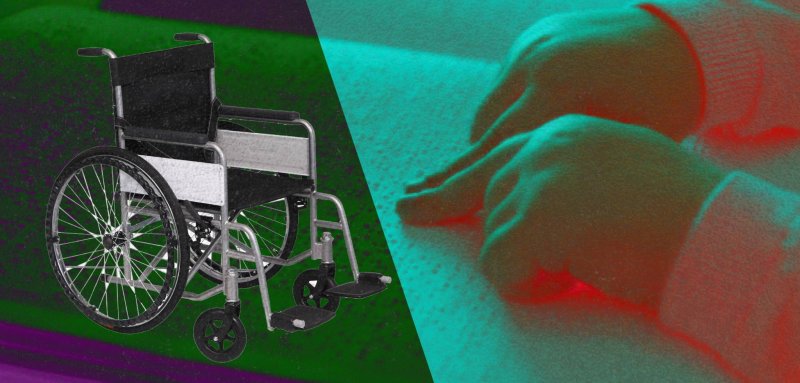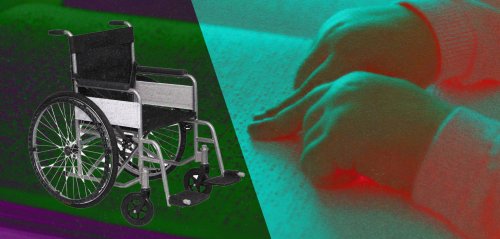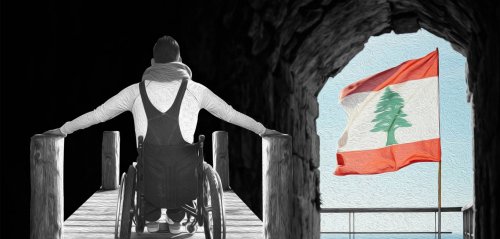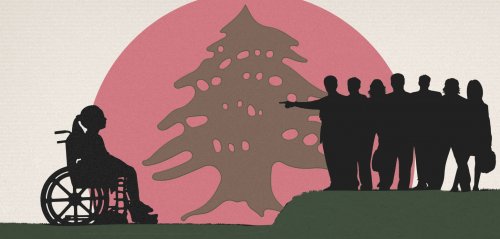"Are you out of your mind? This is an entire country, how will you take it on?!”. This is just one of many criticisms that Heba Abu al-Filat used to hear from time to time from some of the people around her when she’d defend the rights of disabled persons in Jordan.
Heba, a mother of twins, one of whom has a motor disability (cerebral palsy), resolved from early on to accept her son, with all his differences. She joined the “Ibni” (‘My Child’) campaign when it was first established in 2020, after it became known for defending the rights of people with disabilities. Her objectives aligned with the goal of the campaign, which sought to demand the activation of the Law on the Rights of Persons with Disabilities and its articles that stipulate that medical treatment and rehabilitation services are to be provided to them free of charge in Jordan.
$225 per month
Abu al-Filat used to regularly pay 160 dinars ($225) a month for her child's treatment in rehabilitation sessions. She tells Raseef22. “My son, who is 10 years old, receives treatment and therapy sessions, and we demand that he continues to take them until his death.”
These sessions help people with disabilities to integrate more into reality. Heba's child, who had been previously unable to raise his head, can now raise his hand and move it to “wave goodbye”. He also has been able to hold a pen, crawl to the toilet, and other things that may seem normal to many but were a dream for this family.
Despite this, Abu al-Filat is forced to face the world that blames her every day, as those around her keep telling her that there is no use, nothing will be fixed. "What is forcing you? Why do you continue with this?" are words the mother is used to hearing, but she stresses that it is necessary for those affiliated with the campaign to own the cause, because they are the most affected and persistent in demanding their rights and the right to defend them in front of everyone.
Societal stigma was another thing that was added to the list of challenges that Heba, who has always lived in Karak Governorate in the south of the country, must face on a daily basis, as her child grew up in an environment that refuses to engage him, and continues to tell his mother to stop writing about him and about his rights on social media. However her participation in the campaign strengthened her position in defending her son's rights, "A long time ago, I used to wait in line with my son, and we’d have 16 people lined up before us in the hospital. Now I can demand that he be prioritized according to the law, because he has a disability."
The “Ibni” campaign is “a wall standing against any violation facing people with disabilities in Jordan”
And despite hearing the phrase, "If normal people don't even get their rights, you want people with disabilities to get them?”, Heba holds on to her position and sits down with parents to share their children's stories, in an attempt to ignore the unethical and immoral differentiation that society is trying to impose.
Inaccessible centers
Around one in ten people — or a little over 1 million people — in Jordan have a disability, in addition to the elderly and those who are temporarily injured, who may also need accessibility accommodations. The infrastructure in Jordan is often not accessible for those with disabilities.
Accessibility consultant Maysoon Hamarsheh, who suffers from a mobility disability, was denied access to some places sometimes due to lack of accessible and suitable facilities. She is now seeking to enforce the law through her work and benefit the members of the campaign with her expertise.
Perhaps her work as a liaison officer at the Jordanian Ministry of Health made it easier for her to measure the extent to which persons with disabilities benefit from health centers and their services. She tells Raseef22 that some centers were not equipped, criticizing this with “What’s the use of opening these centers without making them accessible to persons with disabilities?"
Hamarsheh recounts visiting centers that contain bathrooms for disabled persons, but finding them closed, or that they are used only by hospital staff or the director. So they appear to be equipped from the outside but are not useful for people with disabilities.
Around one in ten people — or a little over 1 million people — in Jordan have a disability
From investigation to campaign
The idea of the campaign came following the publication of the "Repellent Educational Environment" investigation, by journalist Anas Damra, in which he conveyed the suffering of students with disabilities because schools were not equipped to receive them. Some Jordanian schools even refuse to receive them, despite being obligated to by the Law on the Rights of Persons with Disabilities and the Ministry of Education to accept them, as Article 17 states that "it is prohibited to exclude a person from any educational institution on the grounds or because of disability”.
After the investigation was published, Damra met a group of parents and discussed the next step. They began searching for anything related to the right to education for people with disabilities, because the published investigation would not be enough to bring about change, until they came to the conclusion that there is an often overlooked important right, which is the right to receive free rehabilitation sessions at the Ministry of Health.
Anas, a spokesperson for the “Ibni” campaign, tells Raseef22, "We started saying that since our children are not fully equipped to enter school, it is easy for the principal to reject the child, even though this is illegal.” This prompted them to seek to activate Articles 23 and 24 of the Law on the Rights of Persons with Disabilities, to obtain free rehabilitation and treatment sessions at the Ministry of Health, which begins with the moment a child with disabilities is born.
Damra points out that the campaign, although its goal is to activate the two articles, does not ignore the violations experienced by people with disabilities. He tells of the story of 8 teachers from the Ministry of Education working in the school of the Cerebral Palsy Foundation, and how the ministry decided to stop their expenses. Following pressure from the campaign, the teachers were returned to school and their expenses were refunded.
In another incident, he recounts that they obtained a confession from the Jordanian Judicial Council stating that they refused to hire a young woman because she has a disability, which means that they obtained government recognition on this, and that this is against the law requiring institutions to employ people with disabilities.
The Jordanian Judicial Council admitted it refused to hire a young woman was because she has a disability
10 thousand messages
Some of the most important challenges that the campaign went through was dealing with three Jordanian health ministers, Saad Jaber, Nazir Obeidat, and Firas al-Hawari, which prompted them to create new ways to achieve their demands. Anas says, "There is no response from the government because we are not organized to give the government money. We are demanding the rights of our children and our voice is very loud,” stressing that, “When we decide to be fierce, we will be very fierce."
Damra does not forget what happened to them when one of the health ministers refused to give them a date to hand over the petition that contained the campaign’s demands and was signed by 12,000 people. This prompted them to send his phone number to the parents who are with them, and they all sent him the same text message with just the name changed, "My name is (...) from the ‘Ibni’ campaign, our demand is to meet with you to hand over the petition." The minister later told them that he had received 10,000 messages in one minute.
"We discovered that a Jordanian minister of health does not know that there is an obligation on the Ministry of Health to provide free health insurance for people with disabilities, including treatment and rehabilitation services," Anas says.
Services are a right, not a demand
Dr. Marwan al-Taher, Head of Physical Medicine and Rehabilitation at the Ministry of Health, tells Raseef22 that they are cooperating with the campaign to make people with disabilities more independent and self-reliant by having access to treatment and rehabilitation sessions.
He adds that there is a tendency on the part of the government to expand rehabilitation and make it available in all comprehensive health centers, not just hospitals, which facilitates citizens’ access to them. He says, "We hope that rehabilitation services will not be incomplete, as it is the right of persons with disabilities to obtain them and participate in society.”
“Before, when we heard someone talk about their child who has a disability, it would be about the challenges they face. Now they are speaking about their child’s rights. Families are demanding that the state fulfill its duties and responsibilities”
Regarding the obstacles they face, al-Taher points out that all health directorates have been asked to nominate centers that contain two to three rooms suitable for the rehabilitation of people with disabilities, but many regions have not responded to this, either under the pretext that there is no such place, or because there is only one empty room, according to al-Taher.
He believes that there is a need for partnership between society and the state in order to integrate people with disabilities, in addition to parents who are supposed to support their children, rehabilitate them, and push them to integrate and interact with others.
Anas Damra comments, “Before, when we heard someone talk about their child who has a disability, it would be about the challenges they face. Now they are speaking about their child’s rights. Families are demanding that the state fulfill its duties and responsibilities.”
For its part, the “Ibni” campaign continues to protect persons with disabilities and demand for their rights despite the challenges they face on a daily basis. This social initiative is determined to stand as “a wall against any violation facing people with disabilities in Jordan”.
Raseef22 is a not for profit entity. Our focus is on quality journalism. Every contribution to the NasRaseef membership goes directly towards journalism production. We stand independent, not accepting corporate sponsorships, sponsored content or political funding.
Support our mission to keep Raseef22 available to all readers by clicking here!
Interested in writing with us? Check our pitch process here!








